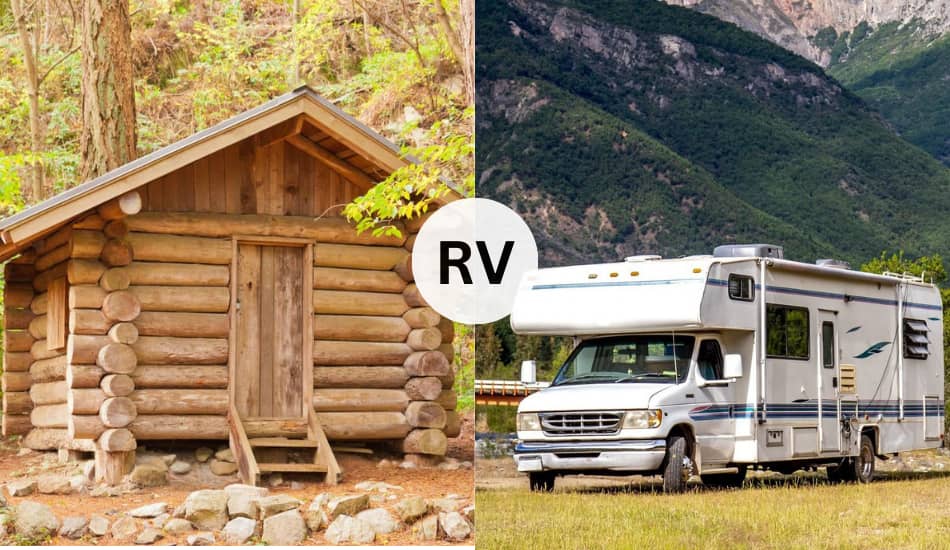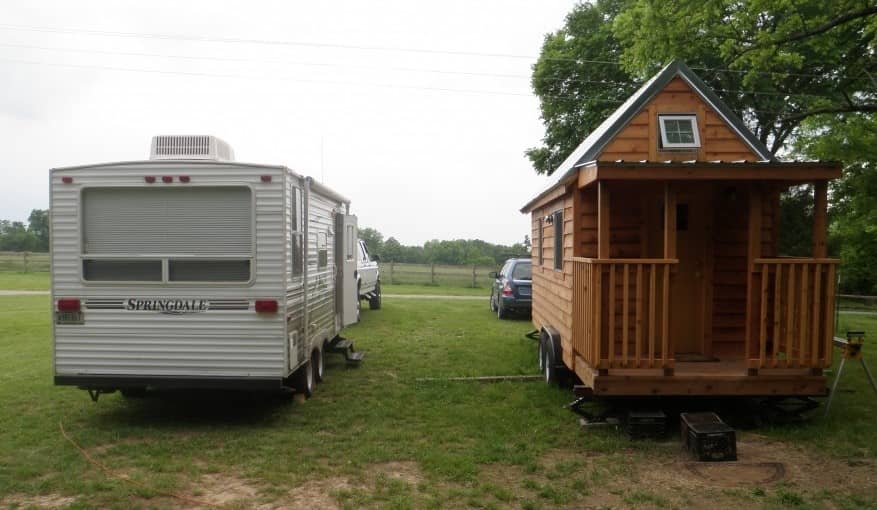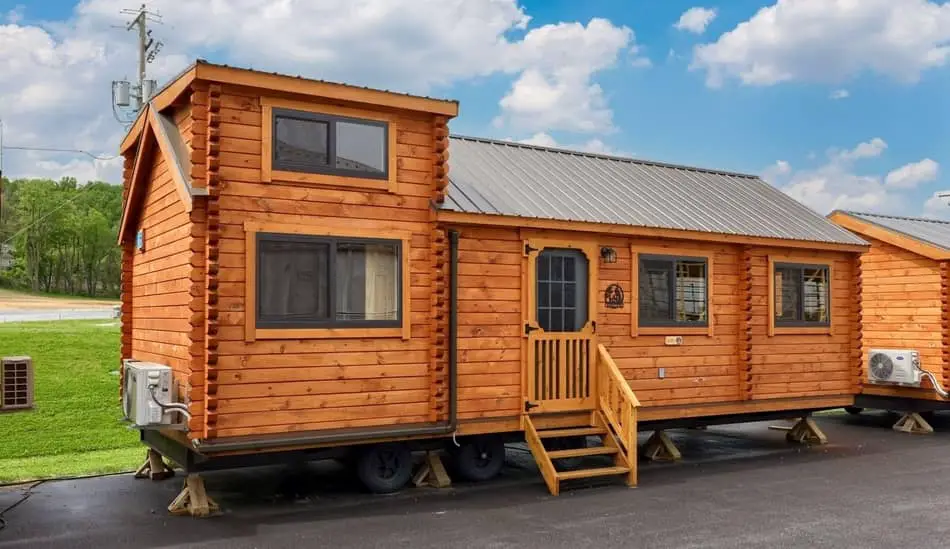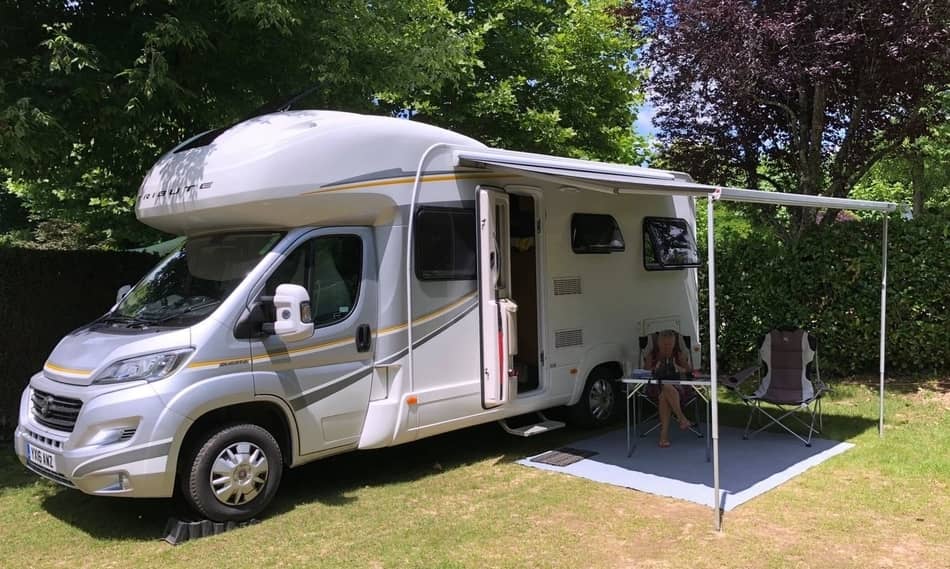Difference Between a Log Cabin And RV

If you struggle to figure out whether opting for a camper or a log cabin on your upcoming family vacation is better, you’re not alone! Although they are completely different, each of them has its advantages, especially if you are a person who loves nature and camping. Given that my family owns both an RV and a log cabin, I’m here to share some insights. In this article, we’ll talk about the difference between a log cabin and RV. Let’s break it down for you.
What Is the Difference Between a Log Cabin and RV? The main difference between owning a log cabin and an RV lies in permanence and flexibility. A log cabin is a fixed structure on land, offering a stable, long-term living space. On the other hand, an RV provides mobility, allowing you to travel and change locations while owning a movable home.
Although a log cabin is a structure that is permanently located in the same location, it does not necessarily mean that it has fewer options than an RV. It’s all a matter of what kind of person you are, the one who likes to travel and change locations or the one who simply likes to relax in nature. Below, we will go over some important differences between a log cabin and an RV.
Table of Contents
5 Main Differences Between a Log Cabin And RV

1. Size Difference
When it comes to size, there is a huge difference between log cabins and RVs. Log cabins tend to be more spacious, offering a lot of space due to their fixed structure. On the other hand, RVs don’t have so much space inside them. This difference in size is also reflected in regulations.
State laws often dictate size limits for RVs, usually capping their floor area at around 400 square feet. Additionally, most states impose a maximum vehicle height of 13 feet and 6 inches for RVs, while log cabins are not subject to such height constraints.
2. Mobility
The distinction in mobility stands out between log cabins and RVs (Recreational vehicles). RVs are designed for travel, allowing you to move your home wherever you go. On the other hand, log cabins are fixed structures, lacking the mobility that RVs offer.
RVs provide the flexibility to explore different places without leaving the comfort of your own living space. Log cabins, being fixed in location, offer a more stable and permanent residence. This contrast in mobility plays a significant role in deciding which option aligns better with your lifestyle and preferences.
3. Aesthetic
The aesthetic differences between log cabins and RVs are huge. Log cabins exude a rustic and traditional charm with their natural wood construction and cozy appearance. On the other hand, RVs often have a more modern and functional design, prioritizing space efficiency.
Log cabins tend to blend into natural surroundings, offering a harmonious connection with the environment. In contrast, RVs showcase a compact and streamlined aesthetic, focusing on convenience and practicality. These aesthetic distinctions can influence the atmosphere and style of your living space, allowing you to choose between a classic and homey vibe or a sleek and contemporary feel.
4. Price
Price variations are significant when comparing log cabins and RVs. Generally, log cabins are more expensive upfront due to their larger size and fixed construction. In contrast, RVs tend to be more budget-friendly, offering a more affordable entry point into mobile living.
However, additional costs such as maintenance, parking fees, and fuel should be considered for RVs. Log cabins, while pricier initially, may have lower ongoing costs. Evaluating your budget and long-term financial considerations is essential when deciding between the two options. The cost disparity is crucial in determining which option is better for you.
5. You’re Not Into Road Trips
If road trips aren’t your thing, the choice between log cabins and RVs is much easier. Log cabins provide a fixed and stable living arrangement, perfect for those who prefer a permanent location. RVs, on the other hand, are designed for travel enthusiasts who enjoy hitting the road frequently.
Opting for a log cabin offers the comfort of a consistent home environment without the need for constant movement. This decision largely depends on whether you’re more inclined to settle down in a specific spot or if you’re eager to embrace a nomadic lifestyle.
Related Article: 10 Advantages Of Log Cabin Homes
Should I Stay In an RV or Cabin on my Next Vacation?

When you’re thinking about whether to pick an RV or a log cabin, a great idea is to try staying in one of them during your upcoming vacation. The kind of experience you’ll have in a log cabin versus an RV home is quite different.
If you’re mainly considering the cost, you might be surprised when you start calculating everything. Even though renting a cabin or vacation home might appear costly at first, it often covers many things that could be extra expenses with an RV. When you rent an RV, you still have to pay for the fuel to tow it, the campsite, facilities, and the place you park it.
Is It Better to Invest in an RV or a Cabin?
In general, having a log cabin on land you own is a much better long-term investment than an RV. Just like your car, an RV tends to lose value over time. However, an RV can still be a smart investment for certain people. If you travel a lot, having an RV might save you money on travel expenses. And you might even earn money by renting out your RV on platforms like RVezy.
On the flip side, there’s no denying that purchasing land and constructing a log cabin is a great long-term investment. The value of a cabin usually goes up as time passes.
Plus, when you’re not using it, you can rent out your cabin on websites like Airbnb or VRBO. RVs can also be turned into a little side business by renting them out. Regardless of your choice, you can make a return on your investment with careful effort.
Things To Consider When Buying a Cabin Or an RV

Once more, it’s important to figure out which one suits your needs best when you’re trying to pick between a log cabin and an RV. What works well for me with an RV might not be the right fit for you. There are aspects you need to think about so you can make the wisest choice:
Having Unwanted Visitors
If you decide to get an RV, you’ll have the flexibility to travel wherever you want with the people you choose. You can keep things low-profile and not worry about unexpected family visits. Also, it’s usually not a common thing to ask if you can borrow someone’s RV, mainly due to insurance concerns and other factors.
If you’re considering letting friends or family use your trailer, knowing exactly what your insurance covers is important. On the other hand, when people know where your log cabin is, they might visit without giving you a heads-up. Some friends and family might even feel comfortable asking to use it for their own vacation. In my family, we’re open to sharing and having get-togethers, but not everyone might feel the same way.
You Don’t Have Space to Store Your RV
Unless you’ll be using your RV all the time, you’ll need a place to park it when you’re not on the road. If you don’t have room at home, there are storage places where you can keep your RV. But remember, this comes with a cost. You must pay for RV storage, which can be anywhere from $50 to $450 monthly, depending on your preferred storage type.
Here is one interesting video where one camper bought a log cabin and live there full time:
Related Article: Where Can I Park my RV to Live and Travel Full-time
FAQ: People Also Ask
Can You Live in an RV as a Cabin?
Many people park their RV in one place and treat it like a cabin. Some campgrounds, especially on the US East Coast, offer deals where you can rent a site for the whole season. This way, campers can come back to the same spot every year. Many people find this a good option because it’s more budget-friendly than building an actual cabin.
Can I buy land and live in an RV?
Yes, you can purchase land and live in an RV there, but there’s a catch. It’s only possible if the county and local government permit it. This might be harder in places with really cold winters.
Final Thoughts
In a nutshell, both a log cabin and an RV are good investments, whether money is a factor or not. They can both pay you back over time and become something valuable. What matters is figuring out which one fits your needs. Ultimately, whether you go for a cabin or an RV, the goal is to enjoy moments and create memories with your dear ones. It’s all about imagining if those experiences will be in a cozy cabin or a travel-ready RV.

